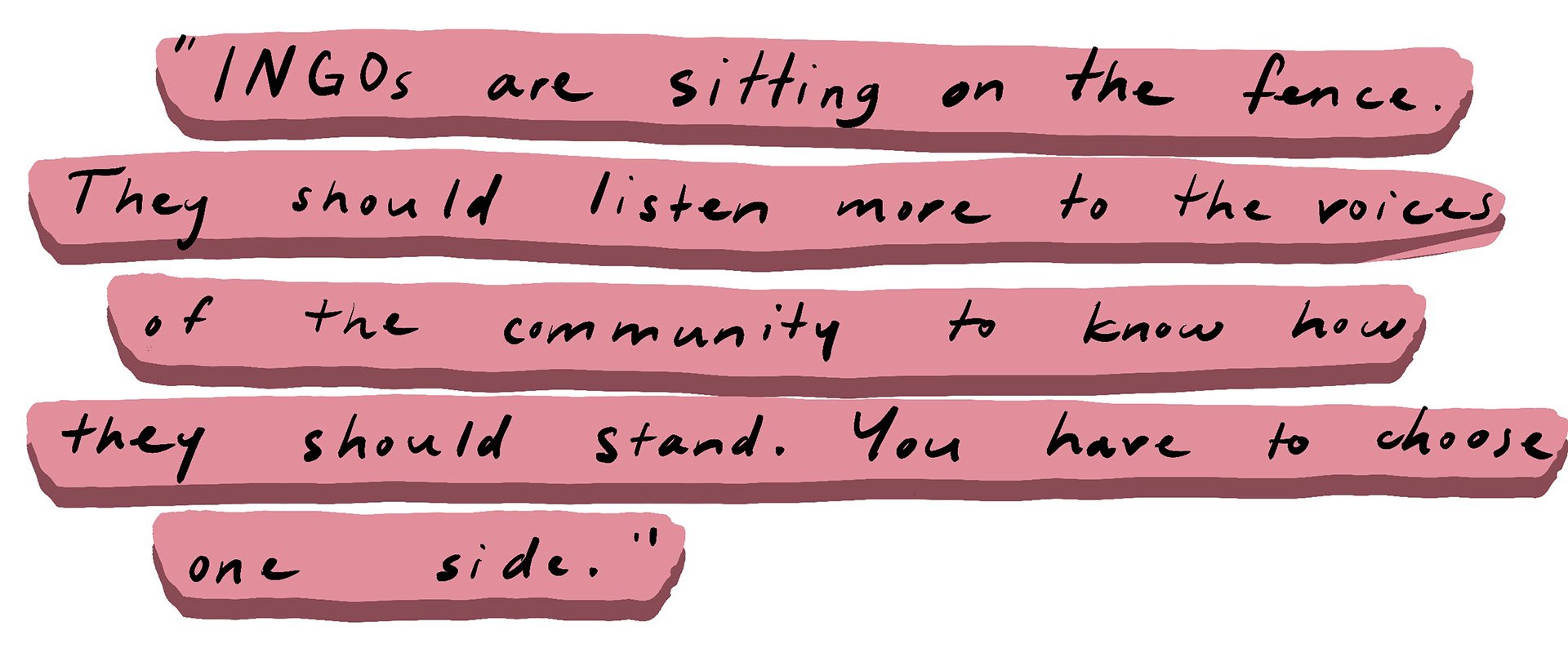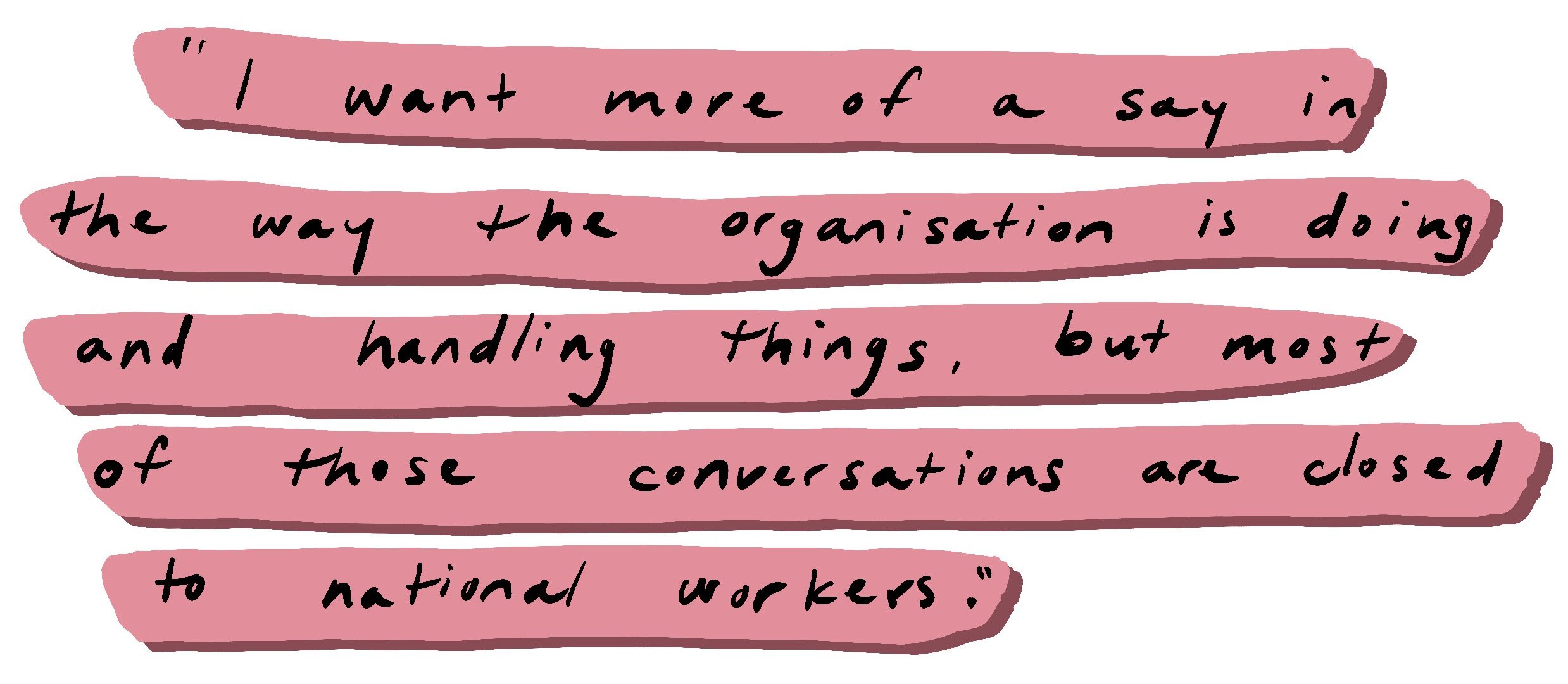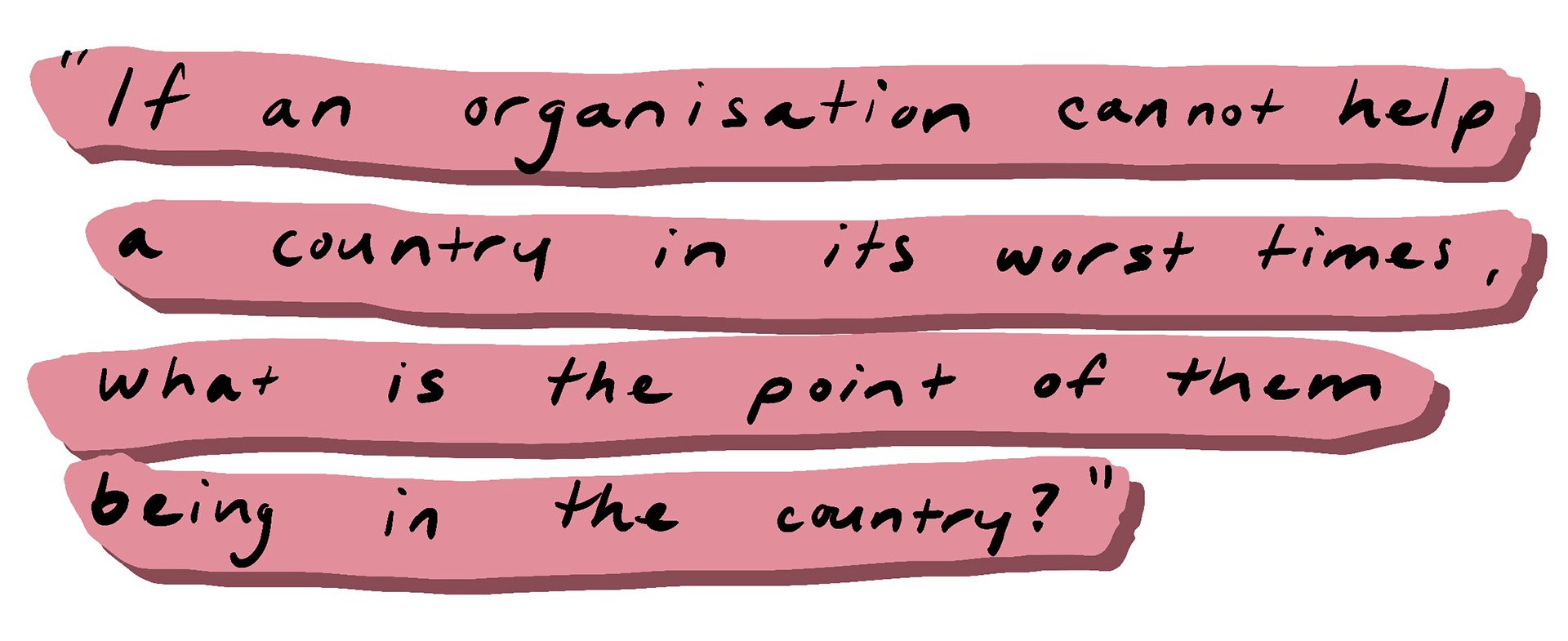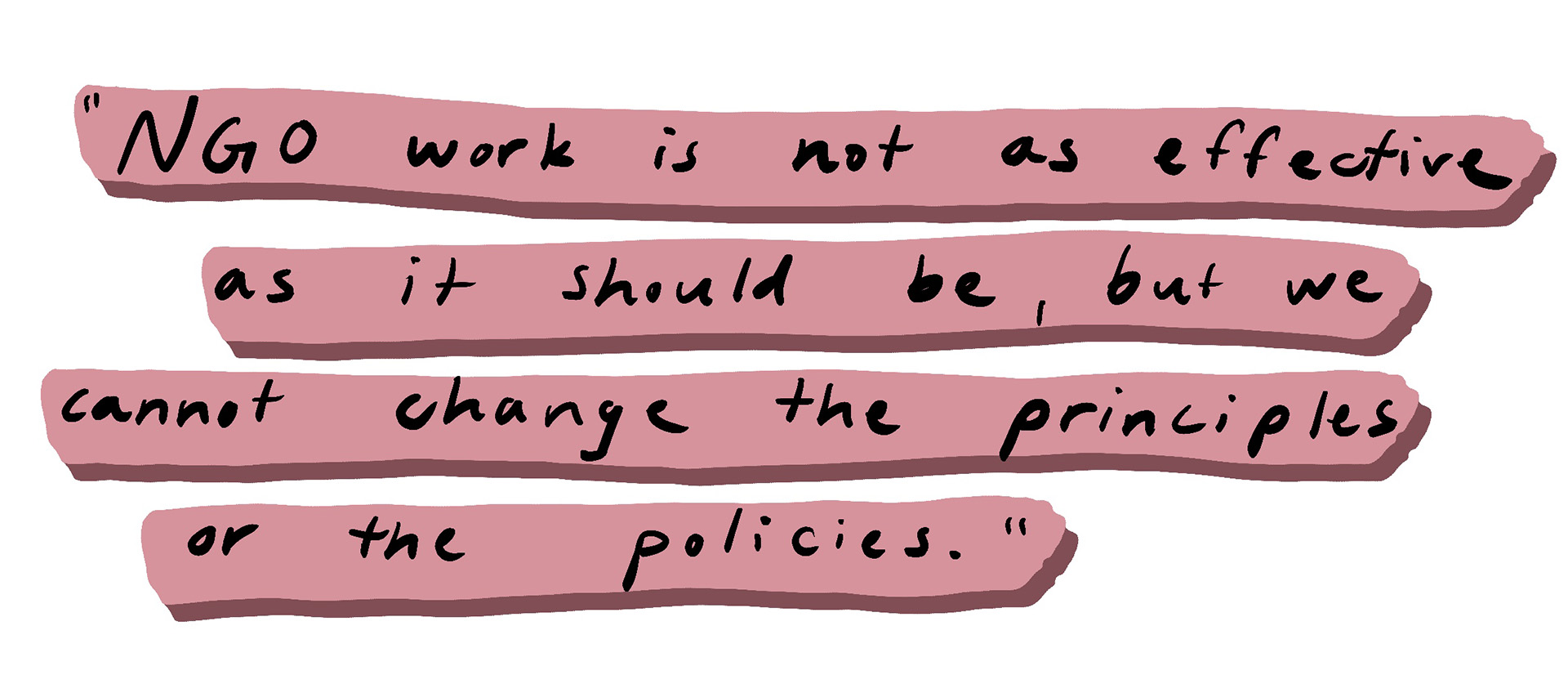In the aftermath of the 1 February military coup in Myanmar, neutrality – one of the core principles of humanitarian aid – is being vigorously challenged.
This is especially the case for local staff working for international aid agencies, who find themselves caught between organisational policies emphasising neutrality and a populace swept up in an anti-coup resistance movement.
“Asking us to remain neutral is not the way,” said Tun Tun, a staff member at a UN field office in Myanmar. “Of course, it’s easy to remain neutral when the act of injustice doesn’t affect you.”
Neutrality is vital to establishing aid access in disasters and conflicts, according to the UN’s humanitarian aid coordination arm, OCHA, which defines the concept as not taking sides or engaging in “controversies of a political, racial, religious, or ideological nature”.
But it has garnered little public support in post-coup Myanmar, where military crackdowns have killed more than 1,000 people and triggered fresh accusations of crimes against humanity.
UN agencies and international NGOs have faced heavy criticism from the Myanmar public for not speaking out more forcefully, at a time when everyday citizens have risked their lives to push back against the coup through street demonstrations, strikes, and armed resistance.
Tun Tun is among five current or former local staff at UN agencies or international NGOs in Myanmar who spoke to The New Humanitarian about their experiences and ethical dilemmas since the coup.
They describe their growing unease at the emphasis their organisations are placing on neutrality in the face of a military that has launched indiscriminate attacks on civilians, targeted healthcare and aid workers, and destroyed relief supplies.
For some, the coup has turned traditional views on the role of international aid in Myanmar on their head. They’re calling for international agencies to take a stronger stand against the military regime, and to focus on supporting local organisations to lead aid responses.
Limits on speaking out
In the weeks following the February coup, Tun Tun longed to demonstrate with his friends, but his UN office had different priorities.
“There were a lot of staff meetings where the main goal was for us nationals to not speak out... to remain neutral. They reminded us that we shouldn’t be portraying our political views,” said Tun Tun, who like others quoted in this story, asked to be identified by a pseudonym in order to speak freely.
But for many Myanmar aid workers, it’s impossible to separate political viewpoints from the worsening humanitarian crisis driven by the military takeover. “This is beyond political; this is the true essence of right and wrong,” said Tun Tun.

At the same time, they face pressure from their friends and communities for working for organisations perceived to be too soft on the military.
UN agencies and bodies release public statements expressing “deep concern”, without taking meaningful action, Tun Tun said. He has become too embarrassed to tell all but his most trusted friends who he works for. “The UN is the butt of the joke in the Myanmar community now,” he said. “As a UN worker, I’m ashamed to say there is nothing more we can do.”
Tun Tun once saw neutrality as a crucial aspect of humanitarian work. That changed with the February coup.
“In an ordinary humanitarian situation, I would agree to biting your tongue and working with the government for the sake of being able to provide humanitarian assistance,” he said. But he believes that today’s crisis requires a more vocal approach.
Questioning the value of aid
Before the coup, Khin Maung was proud to be an aid worker with an international NGO, and believed his work had a positive impact.
But the past few months have left him in despair. Some 220,000 civilians have been displaced since the coup, but Khin Maung worries his work cannot address what’s driving his country’s overlapping crises – the military itself.
“People are facing dire situations, but the root cause is the political turmoil created by the military,” said Khin Maung, who also asked to be identified by a pseudonym. “Without talking about this root cause, trying to feed people when they are hungry is kind of meaningless for many national staff.”
He now avoids conversations about the value of international humanitarian aid in Myanmar after the coup, because he has his own doubts.

Khin Maung said he unquestioningly supported the necessity of humanitarian neutrality before the coup, but his perspective has changed dramatically.
“[International] NGOs are sitting on the fence. They should listen more to the voices of the community to know how they should stand,” he said. “You have to choose one side.”
In Myanmar, the military and government have always been the gatekeepers of aid access, and have frequently denied or restricted it, especially in areas where ethnic armed organisations operate.
Since the coup, authorities have blocked both international and local aid in certain areas, and threatened local aid volunteers. In northwestern Chin State’s Mindat township, where thousands have been displaced by fighting between the military and civilian defense forces, the military allowed the UN’s refugee agency, UNHCR, to deliver relief supplies in July, but reportedly only to camps under its administration.
Khin Maung said the assumption that humanitarian neutrality ensures aid access in Myanmar should be questioned, especially when the authorities granting access are “not humanitarian-minded”.
“Every theory has to be revised and challenged,” he said. “This is the time to challenge these concepts; I think they are not relevant in Myanmar right now.”
Calling a coup a coup
The coup has exposed a distance between Myanmar staff and their expatriate counterparts, said Khine, who works at an international NGO focused on governance. “We become restricted in our own roles and can’t step outside of them,” he said.
While expatriates – who generally hold senior positions – are more able to leave the country, “national staff have to face the consequences of whatever the organisation does during this time”, Khine said.
Many UN agencies and international NGOs have not used the word “coup”. It’s missing from OCHA briefings, for example, and from a public summary describing changes to humanitarian planning, which eschews the word in favour of: “the ongoing situation since 1 February 2021”.
“These are our lived experiences, and our visceral responses aren't what to call the coup, but what can I do about it, how can I help, what is my role, and how can I be most useful, while at the same time trying to keep our families and our friends safe,” said Khine, who also asked to use a pseudonym.

The coup has left him feeling that UN agencies and international NGOs are more responsive to donor governments than to people actually living through crises. “They end up being accountable to colonial structures of power, who may not and do not have the same interests [as] the people of Myanmar regarding how funds should be used,” Khine said.
Despite his concerns, Khine said he feels resigned to having to accept the status quo. “I want more of a say in the way the organisation is doing and handling things, but most of those conversations are closed to national workers,” he said.
Rethinking humanitarianism
Hnin Thet Hmu Khin, who formerly worked for a peacebuilding and humanitarian agency in Rakhine State, said she’s frustrated by sector-wide failures to take a strong public stand against the coup.
“International organisations talk about human rights, democracy, humanitarianism, but they are silent in this crisis,” she said. “If an organisation cannot help a country in its worst times, what is the point of them being in the country?”
Hnin Thet Hmu Khin now advocates for rethinking how humanitarianism works in her country, including the application of neutrality in aid. “Even though we talk a lot about humanitarians not being involved in politics, at this point, politics is important to get access,” she said.

Myanmar’s National Unity Government (NUG), which includes elected politicians opposed to the junta, has advised international aid groups not to legitimise the military, and urged them to respect public boycotts by not stepping in to replace withheld services. It’s also calling for funding to go to local groups and cross-border aid operations.
Hnin Thet Hmu Khin echoed these recommendations. Like other Myanmar aid workers who spoke to The New Humanitarian, she wants international NGOs to engage with the NUG rather than the junta.
She also wants aid agencies to reallocate funds and support to local organisations and communities, so that even if international NGOs stop working in Myanmar, “the local communities will have the capacity to do it”, she said. “This is the best time that [local NGOs] can shine.”
UN staff in Myanmar are discouraged from participating in demonstrations that “may not be consistent with the independence and impartiality required of them as international civil servants”, said the UN’s interim humanitarian coordinator in Myanmar, Ramanathan Balakrishnan.
Staff are allowed to participate in their personal capacity in peaceful protests in “defence of human rights and human rights values”, he added. But since many demonstrations have been met with deadly force, UN personnel are also advised to stay away for safety and security reasons.
UN agencies and international NGOs generally say they’ve tried to minimise direct contact with military authorities since the coup.
The UN has not made any firm commitment to refrain from engaging with the junta.
The UN “engages, where it must, for the purpose of establishing operational arrangements and making sure that humanitarian aid reaches people in need in a timely manner without putting either the affected communities or aid actors at risk”, Balakrishnan said.
‘Social punishment’
After the coup, Joshua Tuangpi wanted to join protests and post on social media, but the international NGO he worked for forbade it.
He began receiving angry messages from people who believed the agency and its staff were failing to speak out, while people across the country were risking their jobs and lives.
“Some people think one way of silence: that these [international NGOs] are nothing for the country,” said Joshua Tuangpi, who also asked to use a pseudonym.
He and his colleagues tried to discuss the issue with senior staff, warning that Myanmar employees and the organisation could be targeted for “social punishment” – where those accused of being connected with or supporting the military, or not doing enough to oppose it, are ostracised or shamed on social media.

“If we don’t post or show our feelings… people will think we are pro-military,” he said. “We advised our international staff that this silence will not only affect our individual [reputations], but also our organisation in the future.”
The response, he said, was that the decision rested with the organisation’s board. The NGO has continued to be silent, he said.
Joshua Tuangpi had once planned to be a career aid worker with an international agency, but the coup pushed him to reconsider. When his contract expired in May, he decided not to renew.
“[International NGOs] were very silent. It really changed my mind,” he said. “I feel like NGO work is not as effective as it should be, but we cannot change the principles or the policies. It depends on international norms... [It’s] better to leave.”
Edited by Irwin Loy.
Have your say: Can aid groups choose sides in Myanmar? Can they deal with the military junta and still build credibility with the public? What are some other ways forward? Send us your thoughts here or tweet us @newhumanitarian.








